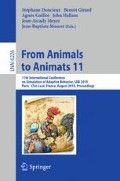Abstract
We introduce a new theoretical framework, based on Shannon’s communication theory and on Ashby’s law of requisite variety, suitable for artificial agents using predictive learning. The framework quantifies the performance constraints of a predictive adaptive controller as a function of its learning stage. In addition, we formulate a practical measure, based on information flow, that can be applied to adaptive controllers which use hebbian learning, input correlation learning (ICO/ISO) and temporal difference learning. The framework is also useful in quantifying the social division of tasks in a social group of honest, cooperative food foraging, communicating agents.
Simulations are in accordance with Luhmann, who suggested that adaptive agents self-organise by reducing the amount of sensory information or, equivalently, reducing the complexity of the perceived environment from the agents perspective.
Access this chapter
Tax calculation will be finalised at checkout
Purchases are for personal use only
Preview
Unable to display preview. Download preview PDF.
References
Ashby, W.: An Introduction to Cybernetics. Chapman & Hall, Boca Raton (1956)
Ay, N., Bertschinger, N., Der, R., Güttler, F., Olbrich, E.: Predictive information and explorative behavior of autonomous robots. The European Physical Journal B 63(3), 329–339 (2008)
Polani, D., Ay, N.: Information ows in causal networks. Adv. Compl. Syst. (2007)
Wörgötter, F., Porr, B.: Isotropic sequence order learning in a closed loop behavioural system. In: Roy. Soc. Phil. Trans. Mathematical, pp. 2225–2244
Wörgötter, F., Porr, B.: Inside embodiment what means embodiment to radical constructivists? Kybernetes, 105–117 (2005)
Booth, T.L.: Sequential Machines and Automata Theory, 1st edn. (1967)
Braitenberg, V.: Vehicles: Experiments in synthetic psychology. MIT Press, Cambridge (1984)
Zhang, J., Bi, D., Wang, G.L.: Novel learning feed-forward controller for accurate robot trajectory tracking. In: Wang, L., Chen, K., S. Ong, Y. (eds.) ICNC 2005. LNCS, vol. 3611, pp. 266–269. Springer, Heidelberg (2005)
Nehaniv, C., Klyubin, A.S., Polani, D.: Empowerment: A universal agent-centric measure of control. Proceedings of the IEEE Congress on Evolutionary Computation 1, 128–135 (2005)
Nehaniv, C.L., Klyubin, A.S., Polani, D.: Keep your options open: An information-based driving principle for the sensorimotor systems. In: PLoSOne, vol. 3 (2008)
Polani, D., Klyubin, A.S., Nehaniv, C.L.: Organization of the information flow in the perception-action loop of evolved agents, pp. 177–180 (June 2004)
Kolodziejski, C., Kulvicius, T.: On the analysis of differential hebbian learning in closed-loop behavioral systems. In: Frontiers in Computational Neuroscience. Conference Abstract: Bernstein Conference on Computational Neuroscience (2009)
Luhmann, N.: Social Systems (1996)
Bullwinkle, D., Lungarella, M., Pegors, T.: Methods for quantifying the information structure of sensory and motor data. Neuroinformatics 3, 243–262 (2005)
Di Prodi, P., Porr, B., Wörgötter, F.: Adaptive communication promotes sub-system formation in a multi agent system with limited resources. In: LAB-RS 2008: Proceedings of the 2008 ECSIS Symposium on Learning and Adaptive Behaviors for Robotic Systems, pp. 89–96 (2008)
Sporns, O., Pfeifer, R., Lungarella, M., Kuniyoshi, Y.: On the information theoretic implications of embodiment - principles and methods. In: Proc. of the 50th Anniversary Summit of Artificial Intelligence, pp. 76–86 (2008)
Porr, B., Wörgötter, F.: Strongly improved stability and faster convergence of temporal sequence learning by utilising input correlations only. Neural Computation 18(6), 1380–1412 (2006)
Blahut, R.E.: Computation of channel capacity and rate distorsion functions. IEEE Trans. on Inform. Theory 18(4), 460–473 (1972)
Rouslton, M.S.: Estimating the errors on measured entropy and mutual information. Physica D, 285–294 (1999)
Arimoto, S.: An algorithm for computing the capacity of arbitrary memoryless channels. IEEE Transactions on Information Theory 18(1), 14–20 (1972)
Stuart, B.: Nicholas minorsky and the automatic steering of ships. IEEE Control Systems Magazine 4(4) (1984)
Sutton, A.G., Barto, R.S.: Reinforcement learning: An introduction. MIT Press, Cambridge (1998)
Schreiber, T.: Measuring information transfer. Phys. Rev. Lett. 85, 461–464 (2000)
Touchette, H., Lloyd, S.: Information-theoretic limits of control. Phys. Rev. Lett. 84(6), 1156–1159 (2000)
Author information
Authors and Affiliations
Editor information
Editors and Affiliations
Rights and permissions
Copyright information
© 2010 Springer-Verlag Berlin Heidelberg
About this paper
Cite this paper
Di Prodi, P., Porr, B., Wörgötter, F. (2010). A Novel Information Measure for Predictive Learning in a Social System Setting. In: Doncieux, S., Girard, B., Guillot, A., Hallam, J., Meyer, JA., Mouret, JB. (eds) From Animals to Animats 11. SAB 2010. Lecture Notes in Computer Science(), vol 6226. Springer, Berlin, Heidelberg. https://doi.org/10.1007/978-3-642-15193-4_48
Download citation
DOI: https://doi.org/10.1007/978-3-642-15193-4_48
Publisher Name: Springer, Berlin, Heidelberg
Print ISBN: 978-3-642-15192-7
Online ISBN: 978-3-642-15193-4
eBook Packages: Computer ScienceComputer Science (R0)

